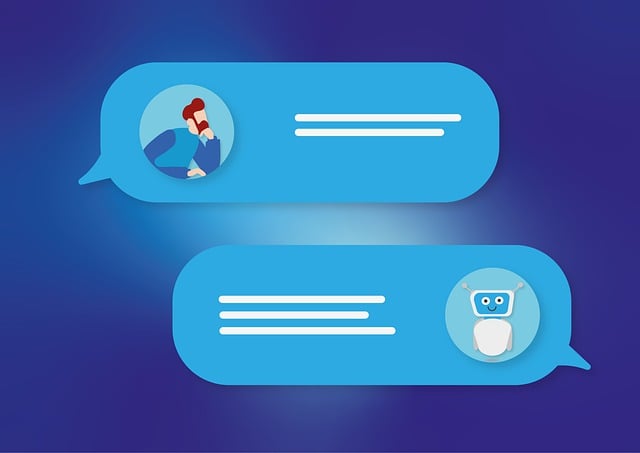AI chatbots revolutionize interactions, offering convenience across sectors but requiring careful consideration of data privacy, algorithmic transparency, fairness, accountability, and user expectations to prevent harm. Developers must prioritize secure data handling, address societal biases, promote inclusive language, and be accountable for outcomes. Core ethical values, including privacy, transparency, fairness, and non-discrimination, guide responsible development and deployment. Clear guidelines ensure positive user experiences while upholding integrity in the AI technology landscape. Regular security audits, mitigation of training data biases, and transparent communication foster public trust. Continuous evaluation through diverse perspectives ensures AI chatbots align with societal values and expectations, promoting ethical use.
As artificial intelligence (AI) chatbots become increasingly integrated into daily life, building ethical frameworks to guide their development and deployment is crucial. This article explores a comprehensive approach to ensuring responsible AI assistant practices. We delve into key areas such as understanding the impact of AI chatbots, defining core values for assistance, establishing guidelines for responsible behavior, safeguarding data privacy, promoting transparency, and implementing continuous evaluation methods. By addressing these aspects, we aim to enhance the ethical landscape of AI chatbot interactions.
- Understanding AI Chatbot Impact and Ethics
- Defining Core Values for AI Assistance
- Creating Guidelines for Responsible Behavior
- Ensuring Data Privacy and Security Measures
- Promoting Transparency in AI Interactions
- Continuous Evaluation and Improvement Methods
Understanding AI Chatbot Impact and Ethics

AI chatbots are rapidly transforming how we interact with technology, offering unprecedented convenience and efficiency in various sectors. However, understanding their impact and ethical implications is crucial as these virtual assistants become more integrated into our daily lives. From data privacy concerns to potential biases in algorithms, several factors demand careful consideration. As AI chatbots process vast amounts of user information, ensuring secure handling and protecting user data from unauthorized access or misuse is essential.
Additionally, the ethical framework should address issues like algorithmic transparency, fairness, and accountability. Chatbots must be designed to avoid reinforcing societal biases present in training data, promoting inclusive language, and guaranteeing unbiased outcomes. Moreover, developers and users alike must be conscious of the chatbot’s limitations, ensuring realistic expectations and preventing potential harm from inaccurate or misleading responses.
Defining Core Values for AI Assistance

Defining core values for AI assistants is a fundamental step in building ethical frameworks. These values serve as guiding principles that ensure the development and deployment of responsible AI chatbots. When crafting these values, it’s essential to consider the impact of AI on society, focusing on aspects like privacy, transparency, fairness, and non-discrimination. For instance, an AI chatbot should respect user data confidentiality, ensuring that personal information is handled securely and used only for intended purposes.
Additionally, core values must emphasize the importance of unbiased decision-making. AI chatbots should be designed to minimize algorithmic biases, ensuring equal treatment and opportunities for all users, regardless of their background or identity. By clearly defining these ethical guidelines, developers can create AI assistants that promote trust, fairness, and respect for human rights, fostering a positive user experience while maintaining integrity in the ever-evolving landscape of AI technology.
Creating Guidelines for Responsible Behavior

As AI chatbots become increasingly integrated into our daily lives, establishing clear guidelines for their responsible behavior is paramount. These guidelines should encompass a range of ethical considerations, including privacy protection, transparency in operations, and fairness in decision-making. Developers must ensure that AI chatbots respect user autonomy by obtaining informed consent and providing clear explanations of data usage.
Furthermore, these frameworks should emphasize the importance of mitigating biases in chatbot training data to prevent discriminatory outcomes. Regular audits and ongoing monitoring are necessary to identify and rectify any ethical lapses. By implementing such measures, we can foster public trust and ensure that AI chatbots serve as beneficial tools for society while upholding the highest standards of integrity.
Ensuring Data Privacy and Security Measures

In the realm of AI chatbots, ensuring data privacy and security measures is paramount. As these intelligent assistants learn from vast datasets to provide accurate responses, they also become potent repositories of sensitive user information. Developers must implement robust encryption protocols to safeguard data during both storage and transmission. Anonymization techniques, such as data masking or tokenization, can help protect individual identities while preserving the utility of the dataset for training purposes.
Moreover, transparency in data handling practices is crucial. Users should be clearly informed about what data is collected, how it’s used, and who has access to it. Consent mechanisms that allow users to grant or revoke permissions dynamically ensure that their privacy remains in their control. Regular security audits and penetration testing are essential to identify and patch vulnerabilities, ensuring the integrity and confidentiality of user interactions with AI chatbots.
Promoting Transparency in AI Interactions

Promoting transparency in AI interactions is a cornerstone for building ethical frameworks for AI assistants, such as AI chatbots. Users should be clearly informed about the capabilities and limitations of the technology they’re engaging with. This includes understanding how the AI makes decisions, what data it uses, and who has access to that data. Transparent practices help build trust between users and AI systems, ensuring folks feel comfortable interacting with these technologies.
In the world of AI chatbots, transparency involves providing clear explanations for automated responses, disclosing any biases in the training data, and offering mechanisms for users to appeal or correct inaccurate outputs. As AI technology continues to evolve, it’s crucial that developers prioritize transparency to ensure these tools serve humanity responsibly and ethically.
Continuous Evaluation and Improvement Methods

Continuous evaluation is a cornerstone in building robust ethical frameworks for AI assistants, such as chatbots. Regular assessments and feedback mechanisms are essential to ensure that these systems evolve aligned with societal values and expectations. This involves rigorous testing, user experience monitoring, and ongoing data analysis to identify potential biases or ethical dilemmas. By adopting agile development practices, creators can promptly address issues, enhancing the transparency and fairness of AI chatbots.
Improvement methods should encompass diverse perspectives through collaborative efforts involving developers, ethicists, users, and stakeholders. Incorporating user feedback and ethical reviews at every stage enables continuous refinement, fostering a culture of accountability. This iterative process ensures that AI assistants not only meet but exceed ethical standards, contributing to their reliability and acceptability in various applications.






